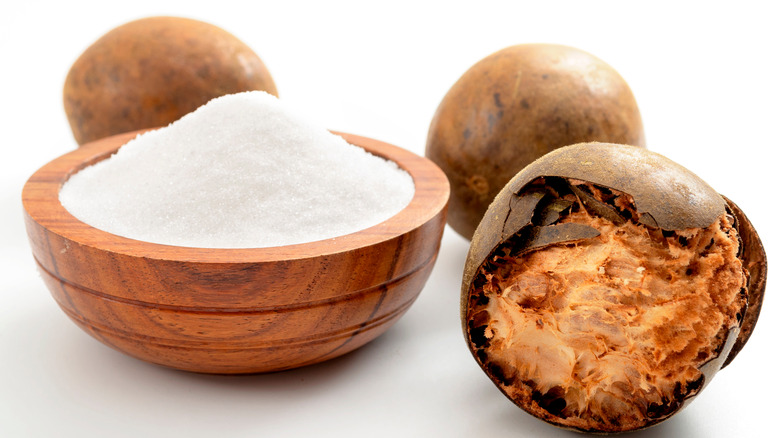New Study Shows Monk Fruit Sweetener May Not Be As Safe As You Think
Updated 5/2/25; erythritol doesn't occur naturally in monk fruit, but rather, erythritol is added to monk fruit products like monk fruit sweetener.
Low-calorie artificial sweeteners have become a popular alternative for dieting and cutting out sugar. But a new study published in the journal Nature Medicine discovered that a sugar replacement and food additive known as erythritol, which is often added to monk fruit products like sweetener, may cause various adverse effects. Erythritol, a sugar alcohol often found in fruits and vegetables, is said to have nearly 70% the sweetness of sugar, and is typically considered to have almost zero calories. According to the study, the ingredient may cause blood clotting, stroke, heart attack, and even death.
CNN reports that Dr. Stanley Hazen, the study's lead researcher, said that "The degree of risk was not modest." Researchers found that if people are already predisposed to heart disease or diabetes, then their risk of having a heart attack or stroke may double if they have large amounts of erythritol in their blood.
"If your blood level of erythritol was in the top 25% compared to the bottom 25%, there was about a two-fold higher risk for heart attack and stroke. It's on par with the strongest of cardiac risk factors, like diabetes," Hazen explained.
Other findings indicated that erythritol may be what causes blood platelets, or cell fragments in the blood that can develop clots or stop bleeding, to clot more easily. If these clots make their way to the heart, it can cause a heart attack. If they go to the brain, it could lead to a stroke.
A link between sweetener and blood clots
CNN reports that Dr. Andrew Freeman, who runs cardiovascular prevention and wellness at National Jewish Health, but did not work on the study, said "There appears to be a clotting risk from using erythritol. Obviously, more research is needed, but in an abundance of caution, it might make sense to limit erythritol in your diet for now."
Despite these concerns, the Calorie Control Council said that the findings contradict years of studies that have shown reduced-calorie sweeteners are okay to use as a substitute. Robert Rankin, the council's executive director, told CNN in an email that "the results of this study are contrary to decades of scientific research showing reduced-calorie sweeteners like erythritol are safe, as evidenced by global regulatory permissions for their use in foods and beverages." He added that the findings "should not be extrapolated to the general population, as the participants in the intervention were already at an increased risk of having cardiovascular events." In other words, because the researchers were focusing on people who were already likely to have these risk factors, the findings may not have this impact on everyone.
Dr. Stanley Hazen, the study's lead author said the results were unexpected. "We never expected this. We weren't even looking for it," he said. The team was initially searching for elements in participants' blood that may determine how likely they are to have a heart attack, stroke, or death in the next several years.
Sweetener and increased risk of heart attack, stroke, or death
The team studied 1,157 blood samples from people who had a potential risk of heart disease between 2004 and 2011. "We found this substance that seemed to play a big role, but we didn't know what it was," Hazen told CNN. "Then we discovered it was erythritol, a sweetener," he said. While the body already produces erythritol, he said the amount they discovered was far more than normal levels.
The team looked at more blood samples from more than 2,100 participants in the U.S. and 833 samples that were gathered in Europe. Participants in all of the samples they looked at had heart disease, elevated blood pressure, or diabetes. More than half of the participants were men and between their 60s and 70s. According to Hazen, erythritol was linked to participants being more likely to have a heart attack, stroke, or death over the next several years because animal studies and other experiments showed erythritol produces rapid blood clotting.
However, Oliver Jones pointed out to CNN that there is a connection between erythritol and blood clotting, but the study does not show that there it is a definitive cause. "As the authors themselves note, they found an association between erythritol and clotting risk, not definitive proof such a link exists," Jones said. "Any possible (and, as yet unproven) risks of excess erythritol would also need to be balanced against the very real health risks of excess glucose consumption," he added.


